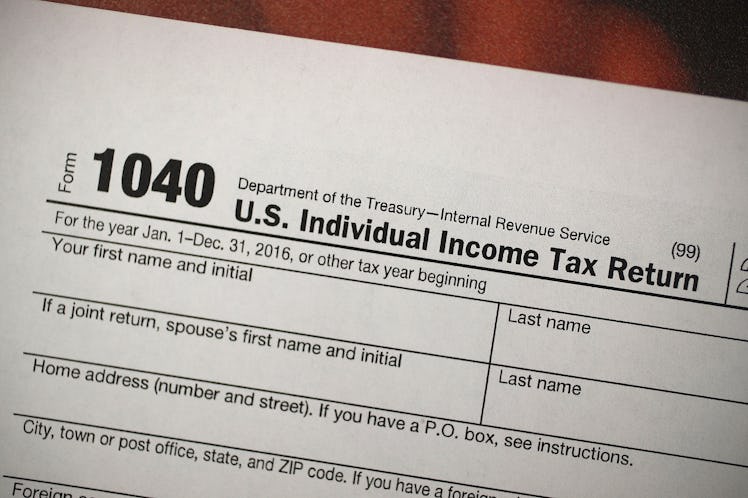
This Is How You Can Tell If Your 2018 Taxes Will Go Up Under The New GOP Plan
As Republicans in Congress were passing their sweeping tax reform bill, President Donald Trump took to Twitter to express his confidence that the legislation would produce easily recognizable benefits. "This is truly a case where the results will speak for themselves, starting very soon," Trump tweeted on Wednesday, Dec. 20. While Trump's tweet went on to emphasize jobs, perhaps the most significant result the tax bill could produce revolves around one question: Will you owe more in 2018 taxes under the GOP plan?
Because of the reform plan — officially called the Tax Cuts and Jobs Act — the federal tax rate is set to decrease across all income brackets except for the lowest one (single filers making up to $9,525 and joint filers making up to $19,050), according to The Wall Street Journal. The exact impact the lowering of those rates have, along with all the other changes the new tax law has introduced, will be apparent once the plan takes effect on the tax season that proceed after the 2018 calendar year.
In other words, the real proof will be in the pudding after Americans file their 2018 returns in 2019, before the annual April deadline. Still, there's been no shortage of analyses from credible sources that have predicted how Americans' 2018 returns might look.
Who Is Predicted To Get A Tax Cut, And Who Isn't
Republicans in Congress, including House Speaker Paul Ryan (WI), have argued that the average family of four will receive a $2,000 tax cut. Meanwhile, some of the country's major newspapers have sought to provide a comprehensive way to answer the all important question, by developing tax calculators.
The Wall Street Journal, for example, has put together a nuanced calculator that will help predict your tax liability by taking into a range of factors, like medical expenses, charitable donations and property taxes.
"The Upshot" at the The New York Times has a much skinnier version of a tax calculator, which takes into account just four factors: marital status, wage bracket, amount of children, and whether or not a filer has taken a standard deduction. According to that particular analysis, a single person making between $25,000 and $75,000 a year with no children and a standard deduction (hi, millennials) will get an average tax cut of $760.
A different analysis from The New York Times predicts what percentage of Americans from 11 different income groups will see a tax cut after filing their returns for the 2018 tax year. That analysis finds that 61 percent of people making between $30,000 and $40,000 a year will see a tax cut, while 81 percent of people making between $50,000 and $75,000 will see a cut as well.
The Bottom Line
One analysis that has been most cited by politicians and news organizations is a study from the Tax Policy Center, a Washington D.C. think tank. The study predicts that, for the 2018 tax year, around 80 percent of Americans will see a tax cut, while around 5 percent will pay more, under the new GOP tax law.
In short, most people are predicted get a tax cut in the first year that the Republican tax reform law has an affect on Americans' yearly returns. If you're wondering why, then, would some Democrats label such a law with words like "moral abomination" take it from the congressman who used that exact term, Senator Bernie Sanders.
When asked by CNN's Jake Tapper whether or not he considers it "a good thing" that the GOP tax law will see most Americans receive a tax cut, Sanders replied, "Yeah, it is a very good thing. And that’s why we should’ve made the tax cuts for the middle class permanent."
Sanders' reply continues a constant criticism from Democrats, who have blasted the law for removing the tax cuts for individuals at the end of 2025, while keeping the tax cut for corporations permanent.
In response to Sanders' interview with Tapper, Senator Ted Cruz tweeted that he agreed with his colleague across the aisle, and invited Sanders to co-sponsor a bill that would make individual tax cuts permanent in January.
Ultimately, the prediction that most Americans will get a tax cut in the short-term is widely agreed upon. The subject of whether those short term affects redeem the bill's long-term impacts, however, is what causes a split of opinion in Congress.
In the meantime, here's one prediction that pretty much everyone can bet on together: Don't hold your breath waiting for Bernie Sanders to work with Ted Cruz on tax policy.